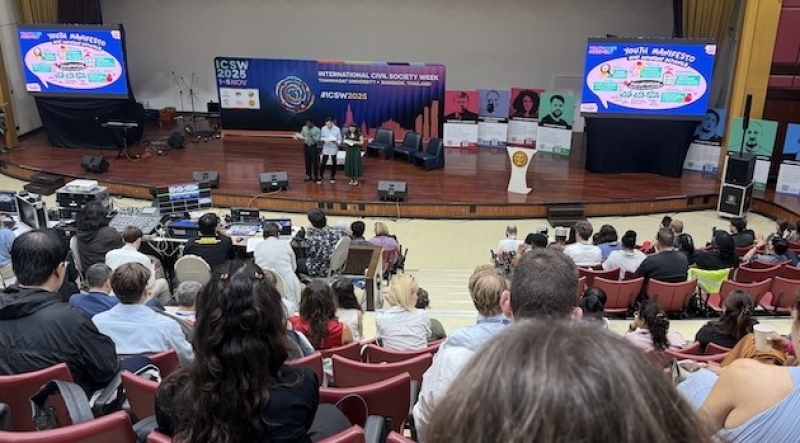- Tarique Rahman returns home amid rapturous reception |
- Home After 17 Years: Tarique Returns to Gulshan Residence |
- Tarique Calls for United Effort to Build a Safe Bangladesh |
- Tarique leaves for 300 feet area from airport |
- BNP top leaders welcome Tarique Rahman on homecoming |
Youth and Boomers Face Off at ICSW Over Power Sharing

A session titled Youth Movements and Democratic Futures in South Asia at International Civil Society Week, held at Bangkok’s Thammasat University.
The message is clear: today’s youth are not “wishy-washy.” They are not just the future—they are the present, full partners in shaping it, and “power-sharing” is the new mantra. Veterans of activism are being reminded to listen, truly hear, and leave egos at the door.
These insights emerged during the five-day International Civil Society Week (ICSW) held at Bangkok’s Thammasat University.
Yet beneath the optimism, many young participants expressed frustration, feeling empowered in words but excluded in practice.
At the session “Youth Movements and Democratic Futures in South Asia,” young voices from Bangladesh, Sri Lanka, India, Pakistan, and Nepal shared concerns about inequality, nepotism, and suppression of dissent.
In Pakistan, student activist Ammad Talpur said: “We long for change, but fear silences us, as those in power will not brook dissent.”
In India, Adrian D’Cruz noted that freedom of speech exists, but journalists, students, and activists challenging authority face harassment, legal action, or institutional pressure. He added that misapplied legal provisions often push people toward self-censorship.
Nepal saw street-level protests fueled by unemployment, corruption, and broken promises. Tikashwari Rai, a young mother, said: “We don’t want to work abroad; we want opportunities here, but many are forced to leave.” She noted that protests came at a high cost, with lives lost and infrastructure damaged.
Sri Lankan activist Melani Gunathilaka said these protests demand systemic change and accountability, reflecting deeper economic hardships, debt, and inequality affecting youth across countries, including Bangladesh and Kenya.
Despite frustrations, the conference explored collaboration between youth and older activists. Talpur noted: “It’s not about taking over; it’s about working together.” Debbie Stothard, founder of the Alternative ASEAN Network on Burma, agreed, saying that older generations must make space and acknowledge the existing power of youth.
Mihajlo Matkovic from Serbia emphasized that youth-led innovation requires civil society to relinquish ego and old hierarchies. Gunathilaka echoed that civil society has often been co-opted by systems prioritizing global trade over local communities, deepening mistrust.
The ICSW highlighted a broader challenge: civil society must confront its own shortcomings and meaningfully engage the next generation to build inclusive, accountable, and equitable movements.

